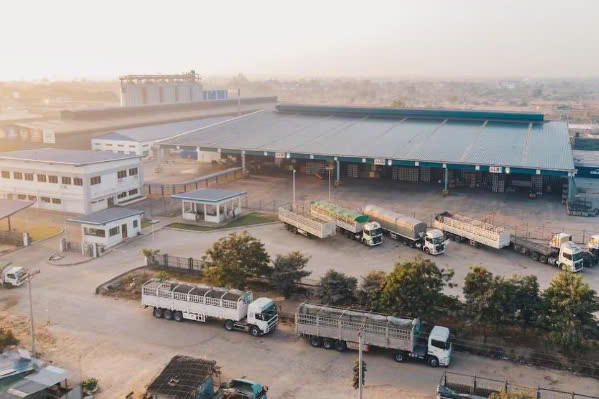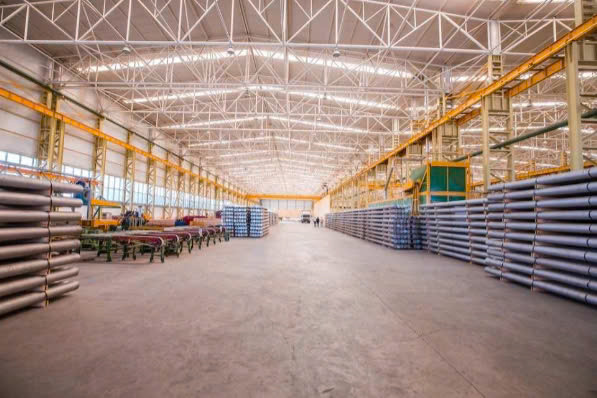Setting up factories in Vietnam: Opportunities for foreign enterprises
Setting up factories in Vietnam: Opportunities for foreign enterprises
Setting up factories in Vietnam for foreign enterprises is gradually becoming a wise
choice for many international corporations. The surge of manufacturing factories in
Vietnam is an opportunity for enterprises to access the Southeast Asian market with many incentives. To gain a deeper understanding of this issue, let's explore the detailed content below with Kizuna.
1. The surge of Vietnam manufacturing factories in 2025
According to the General Statistics Office, the value-added contribution of the industrial sector to Vietnam's GDP in 2024 increased by 8.32% over the previous year and contributed 2.5% to the overall growth rate of the economy. Vietnam is also witnessing strong investment from foreign enterprises, especially in the manufacturing sector.
According to a report by the Ministry of Planning and Investment, foreign direct investment (FDI) in the processing and manufacturing industry reached a record high in 2024, accounting for more than 70% of total FDI. Furthermore, Vietnam's involvement in free trade agreements (FTAs) like the CPTPP, EVFTA, and RCEP has enabled manufacturing companies in Vietnam to easily tap into international markets.
Moreover, the national digital transformation program initiated by the Vietnamese
Government also creates favorable conditions for the development of the manufacturing industry. Enterprises can now apply technology to production lines to improve productivity and reduce costs. As a result, Vietnam is more competitive than other countries in the region.

Many foreign invested factories are located in Vietnam.
2. Advantages when foreign companies set up factories in Vietnam
Foreign companies setting up factories in Vietnam receive many benefits from labor costs, investment attraction policies, geographical location, abundant human resources and especially political stability.
2.1. Vietnam’s competitive labor costs
More than 60% of Vietnam's population is of working age. Meanwhile, Vietnam's labor costs are considered lower than those of neighboring countries such as Malaysia, Thailand, etc., enabling businesses reduce production costs.
2.2. Foreign investment attraction policy
To attract foreign investment, the Vietnamese Government has offered many attractive incentives. In 2020, the Government issued Decree No. 57/2020/ND-CP (amending Decree No. 122/2016/ND-CP) which supplemented regulations on the application of preferential import and export tax of 0%.
Moreover, the Government has implemented many investor-friendly policies, including tax incentives to attract foreign capital and technology. Agreements such as CPTPP, EVFTA, etc. also provide preferential terms, increasing market access for foreign enterprises.

Vietnam carries out numerous policies to attract foreign investment.
2.3. Strategic geographical location for import and export
Vietnam is located in ASEAN which is convenient for trade with countries such as
Thailand, Indonesia, Malaysia, China, Singapore, etc. Its location near major shipping routes with a long coastline is also favorable for trade.
2.4. Abundant and trainable human resources
Vietnam's workforce is known for its strong work ethic, ease of training, and quick
adaptation to the industrial production environment. Additionally, the government actively supports worker training in high-tech sectors to meet the demands of foreign businesses.
2.5. Stable economic and political environment
Vietnam has maintained political and economic stability for many years, providing a safe environment for investors. The government has also made commitments to economic reform and opening up to foreign investment to create a development environment for Vietnam factories.

Foreign companies can be confident when setting up factories in Vietnam.
3. Disadvantages when foreign companies set up factories in Vietnam
In addition to the above advantages, foreign companies setting up factories in Vietnam may also face some challenges such as:
3.1. Limitations on infrastructure and logistics
While Vietnam's infrastructure and logistics have seen improvements in recent years,many shortcomings still remain. According to a World Bank report, logistics costs inVietnam account for about 20% of GDP, higher than the average of 10-15% in manydeveloped countries.
Furthermore, the road system is not uniform, seaports are not fully exploited and there is ashortage of modern logistics hubs. These continue to be significant challenges formanufacturing companies.
3.2. Challenges in administrative procedures
A survey conducted by the Vietnam Chamber of Commerce and Industry (VCCI) found that many foreign companies consider administrative procedures in Vietnam to still be complex. Construction permits and environmental permits take a long time, lasting from 6 months to 1 year.

Administrative procedures for building factories in Vietnam are still complicated.
3.3. High land costs in large industrial parks
According to CBRE Vietnam, land rental rates in large industrial parks have increased by an average of 15-20% per year. The rise in land rental rates results in higher investment costs and impacts businesses' ability to expand.
4. Elimination of barriers to foreign companies establishing
factories in Vietnam
To overcome the difficulties when setting up a factory in Vietnam, enterprises may apply some solutions such as:
4.1. Market research and detailed investment planning
Before making an investment decision, enterprises should thoroughly research the market to evaluate demand and growth potential. They may refer to reports from organizations like the VCCI, Ministry of Industry and Trade, and others to make informed choices.
4.2. Selection of appropriate investment structure
There are three forms of investment in Vietnam for foreign enterprises, including:
▪ 100% foreign owned company: Foreign companies have complete control over
operations but there are still some minor restrictions.
▪ Joint venture with Vietnamese company: Foreign enterprises collaborate with
Vietnamese
▪ Business Cooperation Contract (BCC): Flexible investment capital and liability.
Depending on the actual situation, enterprises will propose appropriate investment
structures.
4.3. Obtainment of permits and legal guarantees before operating the
factory
The process of obtaining licenses and legal guarantees before operating can be
complicated. Therefore, enterprises should cooperate with legal consultants or law firms in Vietnam to ensure that the necessary documents are prepared correctly.

Enterprises should cooperate with consultants to ensure adequate preparation of documents.
4.4. Leverage of tax incentives and support policies
Vietnam offers various tax incentives for foreign companies setting up factories in the country, including reductions in corporate income tax, machinery import tax, and support
for land rental costs. As a result, businesses should familiarize themselves with these terms to maximize their benefits.
4.5. Optimization of infrastructure construction costs
Many enterprises choose to lease factories in Vietnam through factory leasing companies such as Kizuna. Leasing a factory will shorten construction time as well as investment costs.
4.6. Early recruitment of employees to ensure labor quality
To prevent labor shortages, enterprises should implement recruitment and training plans in advance. Enterprises can partner with vocational training institutes, universities, colleges, and technical schools to ensure employees possess the necessary skills.
To avoid labor shortages, enterprises should carry out recruitment and training plans early. Enterprises may cooperate with vocational training schools, order human resources from universities, colleges, vocational schools, etc. to ensure that employees have the appropriate skills.

Hire staff early to avoid production delays
Thanks to numerous outstanding advantages, choosing to set up factories in Vietnam is gradually becoming the choice of many foreign enterprises. . If you wish to learn more about Kizuna's ready-built factory to save investment costs, please do not hesitate to contact our hotline 0272 3900191 for detailed support.